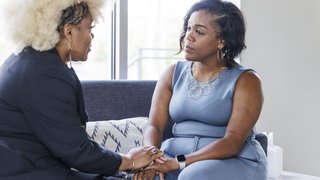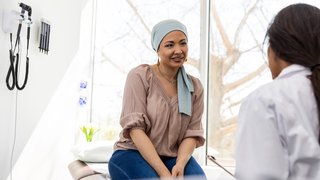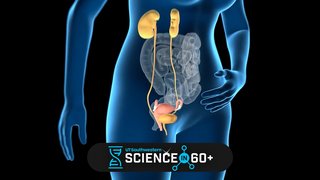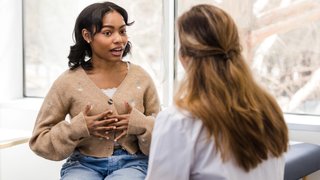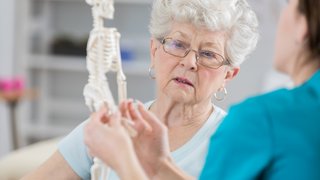Tests and exams women need at different life stages
October 14, 2024

I don’t have to tell you that women wear a lot of hats. You manage your family’s health and well-being, oversee the household, and contribute to your community as well as your work. With all these responsibilities, it’s easy to let your own health take a back seat.
But remember: The caregiver needs care, too.
Even if you feel well, it’s important to keep up with your recommended screenings and medical appointments.
Women’s wellness starts in the teen years and continues after menopause. Health risks change as we get older, and with each stage of life, your doctor will have new recommendations to prevent and check for potential health concerns.
While there are several general screenings, tests, and exams that all women need, some will be unique to your personal health risk factors and family medical history. Use this timeline as a guide to build a prevention and early detection strategy for lifelong health and wellness.
For preteens and teens
The onset of puberty means big changes in the body and brain, and it often comes with confusion or even fear. Younger patients should begin to feel comfortable talking openly about menstruation, breast development, birth control, body image, and other historically taboo topics.
Your health care provider should help you or your child understand what’s normal and what’s not, explain the risk factors for health problems, and clarify which warning signs shouldn’t be shrugged off. Here are recommended exams for young women:

- Well-child visits every year, including immunizations, screenings for hearing, vision, scoliosis, and nutrition counseling
- Dental and vision exams at least every two years
- Regular testing as part of an annual physical (cholesterol, blood sugar, blood pressure)
- Education about menstruation, feminine hygiene products, and what’s normal and not for teen periods
- Screenings for anxiety, depression, eating disorders, substance use, and interpersonal or domestic violence
- Human papilloma virus (HPV) vaccination at age 11 or 12
- Meningitis (meningococcal) vaccine at age 11 or 12, with a booster at age 15
- COVID-19 vaccine boosters as needed
Older teens need information about sexual health, which they can discuss with their pediatrician or a pediatric adolescent gynecology expert. If a patient is sexually active, we recommend a chlamydia screening every year because this sexually transmitted infection (STI) rarely shows symptoms.

Does breast or ovarian cancer run in your family?
If other women in your family have been diagnosed with cancer in a breast or ovary, you may be at risk for the same or similar type of cancer. We can refer you to our Genetic Cancer Prevention Clinic for genetic counseling and whole-patient care.
In your 20s and 30s
Our second and third decades bring physical changes, shifts in personal and social dynamics, and different lifestyle habits that can affect health in the long term. Women should be especially aware of their reproductive health during this time – menstruation, pregnancy, birth control, and STIs. Screenings and preventions for women in their 20s and 30s include:

- Annual well-woman exams
- A pap test for cervical cancer every three years
- Skin cancer screenings if you spend a lot of time in the sun
- Chlamydia tests every year
- STI tests if symptoms appear
- Dental and vision exams at least every two years
- A diphtheria/tetanus booster (Td or Tdap) every 10 years
- Annual flu vaccines
- COVID-19 vaccine boosters as needed
In your 40s and 50s
Ah, the joys of perimenopause and menopause. The average age for women to stop menstruating is 51, which means the hormonal changes which characterize this transition can start in your late 30s/early 40s. Either way, it’s not a quick process, and hot flashes aren’t the only side effect. Age 50 is also the magic number for more frequent cancer screenings.

Recommended exams and screenings include:
- Annual well-woman exams – come ready to discuss the changes you might be experiencing including menstrual changes, energy, sleep, and weight changes
- Annual mammograms to screen for breast cancer starting at age 40, or earlier if you have a family history of breast cancer
- A colonoscopy to screen for colorectal cancer every 5-10 years starting at age 45, or more frequently if needed
- Skin cancer screenings
- Cervical cancer screening every 3-5 years if you are average risk
- Lung cancer screening if you smoke or were a regular smoker
- A blood glucose test called A1C for pre-diabetes or diabetes at least once a year
- Two doses of the shingles vaccine at age 50
- The pneumococcal (pneumonia) vaccine if you have risk factors
- A diphtheria/tetanus booster (Td or Tdap) every 10 years
- A flu vaccine every autumn
- COVID-19 vaccine boosters as needed

Is a vitamin or mineral deficiency slowing you down?
You probably know that women need calcium for healthy bones, especially as we get older. That’s not the only nutritional deficiency to be concerned about. Vitamins D and B12 keep our energy levels up and our brains and digestive systems functioning. We also need iron, iodine, and magnesium. Your doctor can order blood tests and recommend specific foods or supplements to get you back on track.
In your 60s, 70s, and beyond
At this stage, your periods should have completely stopped. If you are having any vaginal bleeding or irregular spotting or discharge, this needs investigation. The focus of visits should be on maintaining function and health span.
Meet with your health care provider for screenings and exams, such as:
- Yearly well-woman exams
- Bone density test for osteoporosis starting at age 65
- Annual mammograms
- A colonoscopy every 5-10 years
- Skin cancer screenings
- Blood sugar tests for diabetes
- Assessments for memory disorders like dementia and Alzheimer’s disease
- Tests for potential sleep disorders such as obstructive sleep apnea
- A diphtheria/tetanus booster (Td or Tdap) every 10 years
- The shingles vaccine if you haven’t already had it
- The pneumococcal (pneumonia) vaccine starting at age 65
- The new respiratory syncytial virus (RSV) vaccine if you are age 75 or older, or age 60-74 if you are at higher risk for RSV complications
- Flu vaccines every year
- COVID-19 vaccine boosters as needed
Good health comes from good habits
Many of my patients use a notepad app on their phones to jot down questions and concerns. In between checkups, you can take advantage of telehealth appointments to talk about worrying symptoms or mental health issues.
Think of it as the most important kind of self-care. Staying connected with your doctor and staying current with recommended health screenings gives you vital information about your body – and as the saying goes, knowledge is power.
To talk with a women's health specialist, call 214-645-8300 or request an appointment online.



